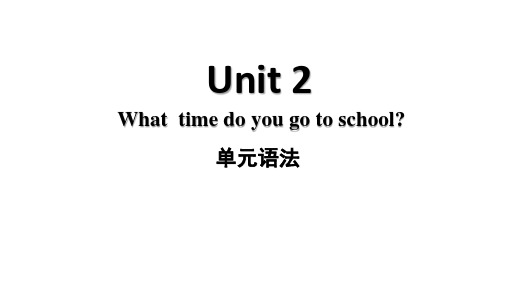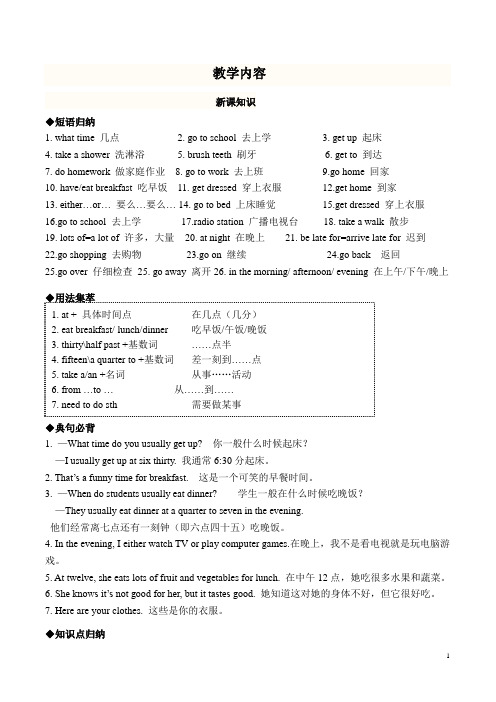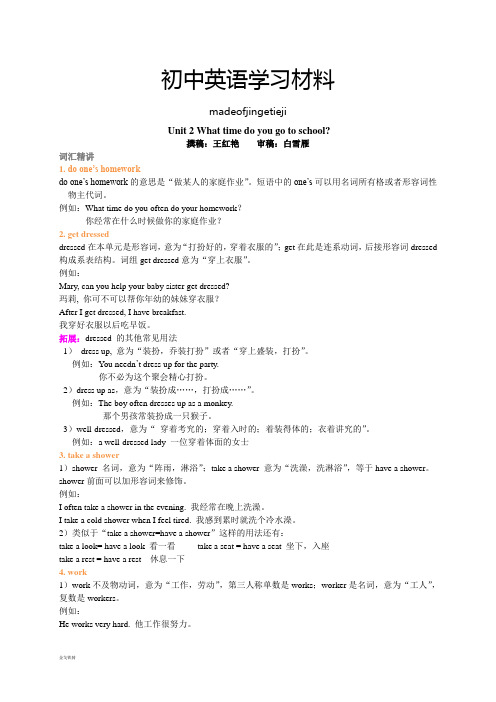七年级英语下册《Unit 2 What time do you go to school(第1课时)》学案(无答案)(新版)人教新目标版
人教七年级英语下册Unit2 What time do you go to school语法

(2)当询问某年某月某日的上午、下午、晚上等某个具体时刻钟点时,用what time。 当泛指“做某事的时间”时,when和what time一般可互换。
The student often plays basketball at school.这名学生经常在学校打篮球。 My friends always help me with my English.我的朋友们总是在英语上帮助我。 Sometimes Jim plays the piano after lunch.吉姆有时在午饭后弹钢琴。
A.in
Br.Wang ___D_____ gets up early.So he is ________ late for work.
A.always;always
B.never;never
C.always;often
D.always;never
9. —___B_____ do you usually help your mom with housework (家务)?
二、单项选择
6. —___B_____ —It's ten o'clock. A.Where is it? B.What's the time in Beijing? C.What’s it in Beijing?
7. —David,when do you get up every day?
—I usually get up __B______ half past six. I'm never late for school.
七年级英语下Unit 2 What time do you go to school作文

Unit 2 What time do you go to school?一、话题分析本单元以“日常作息习惯”为话题,要求学生学会运用一般现在时、学会正确表达时间以及正确使用频率副词(never,usually,sometimes,always等),并以此来谈论日常生活。
二、文章结构1. 时态:一般现在时2. 段落布局One’s School Day(题目居中)开篇点题 This is my/ one’s school day.上午 get up at几点; eat breakfast at几点描述一天 go to school; have classes的活动中午十二点 eat lunch下午:go home;晚上:watch TV总结 tired but happy【注】使用连接词after that;then;and等;注意文章的人称。
三、例题【1】假如你是Peter,请根据下面的时间表,写一篇短文,描述你的一天。
My School DayHello! I’m Peter. This is my school day. I usually get up at seven o’clock in the morning. Then I eat breakfast. After that, I go to sch ool at eight. We have classes from 8:30 to 11:30. I usually eat lunch at school at twelve o’clock. I go home at 4:30 and then I play basketball with my friends.This is my school day. I am busy but happy.【2】假设下表是Tom的日常生活时间表,请根据表格提示,写一篇短文,介绍Tom’s School DayThis is Tom’s school day. He gets up at 6:40 in the morning. Then he has breakfast at 7:10. After that, he goes to school at 7:40. He has classes from 8:00 to 11:30. At twelve o’clock, he eats lunch at school. And he has classes from 14:00 to 16:00 in the afternoon. He eats dinner at 17:50, and then he does his homework. At half past nine in the evening, he goes to bed.This is Tom’s school day. He is busy but happy.。
人教版七下 Unit 2 What time do you go to school?知识点总结

Unit 2 What time do you go to school?必背短语get up 起床 get home到达家中 get to work到达工作岗位 make breakfast做早饭make a shower schedule做一个洗澡的安排 practice guitar 练吉它 leave home 离家take a shower = have a shower 洗淋浴澡 take the Number 17 bus to the Hotel 乘17路公共汽车去旅馆go to class 上课 go to school 上学 go to work 上班(反义词 go home)have breakfast/dinner/lunch吃早晚午饭put on 穿衣服(反义词take off) do one’s homework 做家庭作业tell sb. about sth. 告诉某人某事 tell sb. to do sth. / tell sb. sth.know about sth. 知道某方面的情况 love to do/doing = like to do/doing 喜欢干某事listen to the early morning news on radio 听电台早间新闻 listen to 听…watch the early morning news on TV 看电视早间新闻around six o’clock 六点左右 in the morning 在早上 in the afternoon 在下午 in the evening 在晚上考点解析※get up 起床 eat breakfast=have breakfast 早餐(三餐前省略冠词)have三餐吃…..※job与 work job与 work 都是指工作,但job是可数名词,work是不可数名词. a job 一份工作 work 可以做动词讲,但是job不可以※Life 生活 lives (复数) health健康 healthy健康的 healthily健康地unhealthy 不健康的 keep health 保持健康 healthy food 健康食品have a healthy life =live a healthy life 过着健康的生活※3个穿的区别:wear 表状态,接服装、手套、眼镜、香水等 put on 表动作,接服装dress 表动作,接sb/ oneself get dressed穿衣语法精讲1,问时间what time或者when what time询问具体时间(几点几分) when:时间、日期、年份、月份等提问2,take a shower=have a shower 沐浴3,at a radio station 在广播电台 from……to ……从……到…..(连接两个时间或地点)4,be/ arrive late for :迟到 be late for school5,exercise 锻炼,练习(动、不可数名词) do/take exercise 做锻炼(运动)6,频度副词(实意动词前;be动词后)Always usually often sometimes seldom hardly never★下面的排列更直观地说明了这几个词的频率的"大小"。
七年级英语下册_Unit2_what_time_do_you_go_to_school知识点__练习和答案

教学内容新课知识◆短语归纳1. what time 几点2. go to school 去上学3. get up 起床4. take a shower 洗淋浴5. brush teeth 刷牙6. get to 到达7. do homework 做家庭作业8. go to work 去上班9.go home 回家10. have/eat breakfast 吃早饭11. get dressed 穿上衣服12.get home 到家13. either…or… 要么…要么… 14. go to bed 上床睡觉15.get dressed 穿上衣服16.go to school 去上学17.radio station 广播电视台18. take a walk 散步19. lots of=a lot of 许多,大量20. at night 在晚上21. be late for=arrive late for 迟到22.go shopping 去购物23.go on 继续24.go back 返回25.go over 仔细检查25. go away 离开26. in the morning/ afternoon/ evening 在上午/下午/晚上◆用法集萃1. at + 具体时间点在几点(几分)2. eat breakfast/ lunch/dinner 吃早饭/午饭/晚饭3. thirty\half past +基数词……点半4. fifteen\a quarter to +基数词差一刻到……点5. take a/an +名词从事……活动6. from …to … 从……到……7. need to do sth 需要做某事◆典句必背1. —What time do you usually get up? 你一般什么时候起床?—I usually get up at six thirty. 我通常6:30分起床。
初中英语七年级下册 Unit2 what time do you go to school

always
usually
often
sometimes
never
频度副词的位置
频度副词通常位于实义动词之前,be动词之后:
Tom is always late for school.
Mary doesn’t often help her friends.
___________________________________
4) _______________________________?
Anna never eats breakfast.
5) What time does your best friend go to school?
_________________________________
Jenny: I usually get up at 7:00.
You: What time do you exercise?
Jenny: I usually exercise at eight.
You: What time do you usually eat dinner?
Jenny: I usually eat dinner at 6:30.
人教版英语科目第二单元第二课时教学设计
Unit 2 What time do you go to school?
Section A (Grammar Focus-3c)
课题
Unit 2 What time do you go to school?
单元
第二单元
学科
英语
年级
七年级下册
人教版七年级下册英语《Unit2Whattimedoyougotoschool》词句精讲精练

初中英语学习材料madeofjingetiejiUnit 2 What time do you go to school?撰稿:王红艳审稿:白雪雁词汇精讲1. do one’s homeworkdo one’s homework的意思是“做某人的家庭作业”。
短语中的one’s可以用名词所有格或者形容词性物主代词。
例如:What time do you often do your homework?你经常在什么时候做你的家庭作业?2. get dresseddressed在本单元是形容词,意为“打扮好的,穿着衣服的”;get在此是连系动词,后接形容词dressed 构成系表结构。
词组get dressed意为“穿上衣服”。
例如:Mary, can you help your baby sister get dressed?玛莉, 你可不可以帮你年幼的妹妹穿衣服?After I get dressed, I have breakfast.我穿好衣服以后吃早饭。
拓展:dressed 的其他常见用法1)dress up, 意为“装扮,乔装打扮”或者“穿上盛装,打扮”。
例如:You needn’t dress up for the party.你不必为这个聚会精心打扮。
2)dress up as,意为“装扮成……,打扮成……”。
例如:The boy often dresses up as a monkey.那个男孩常装扮成一只猴子。
3)well-dressed,意为“穿着考究的;穿着入时的;着装得体的;衣着讲究的”。
例如:a well-dressed lady 一位穿着体面的女士3. take a shower1)shower 名词,意为“阵雨,淋浴”;take a shower 意为“洗澡,洗淋浴”,等于have a shower。
shower前面可以加形容词来修饰。
例如:I often take a shower in the evening. 我经常在晚上洗澡。
人教版七年级下册英语:Unit 2 What time do you go to school知识点讲解及练习题目及答案
Unit 2 What time do you go to school?单元复习题重点知识点讲解1. what time与whenwhat time翻译为“几点”问的是具体的时间,一般回答要具体到小时。
What time do you go to school?I go to school at half past seven o’clock.回答具体到点钟,且注意在几点前边的介词用at。
when也是对时间的提问,但与what time的区别是:用when提问,回答既可以是具体的时间,也可以是不具体的时间,如:in the morning,last year,in 1998等范围大的时间。
向对方询问具体时间时,即几点几分,只能用what time,不能用when。
询问年份、月份、日期时,只能用when,不能用what time。
2. 英语时间的表达(1)整点时间可表示为“钟点数+o’clock”或直接读钟点数,省去o’clock。
如:It’s ten o’clock a. m.现在是上午十点整。
(2)非整点时间可直接采取读数法。
如:It’s eight-thirty. 是八点三十分。
注意时间的表达方式:用数词。
点与分钟之间用连字如:注:英语时刻的表达法:顺读法和逆读法。
顺读法:钟点数+分钟数。
4:25→four twenty-five,6:58→six fifty-eight,7:00→seven o’clock 说明:这种表达不论分钟数是多少,均可使用。
逆读法:分钟为+介词to/past+钟点数,可分两种情况:1)分钟为不超过半小时,用分钟数+past (/pa:st/过+钟点数。
4:23→t wenty-three past four,5:19→nineteen past five.2)分钟数超过了半小时,用(所差的)分钟的+to+(下一个)钟点为。
10:58→two to eleven 7:31→twenty-nine to eight在逆读法中分钟数逢“五”逢“十”可省略minute(s)。
人教版七年级英语下册《Unit 2 What time do you go to school》教案
《Unit 2 What time do you go to school》教案Teaching objectives knowledgeThetarget1. Learn and master the following words:up get up dress g et dressed brush toothshower take a shower usually forty wownever early fifty job work station radiostation o’clock night funny exercise2. To learn to ask and talk about the spokenlanguage of the time, make the schedule:-What time do you usually take a shower?-I usually take a shower at six forty.-What time do you usually get up?-I usually get up at eight thirty at night.AbilitytoThetarget1) learning with credit to special questions abouttime and time.2) with the knowledge of the target language t o lifeand learning activities to make plans, to reasonablyarrange work and rest time.emotionalTheSection A, talk about the topic is "routine" time,the learning content close to student's life, becausethe students' work and rest time arrangement is verytarget regular. By asking each other or talk about yourself or a loved one's work and rest time arrangementand activity plan, and punctuality can cultivatestudents' good habit, the habit.Teaching important points Learn to ask and talk about time and make the schedule.Teaching difficultpoints Credit to guide the expression of special questionsand time.The teachingmethodTask-based teaching method and teaching.。
PEP人教版英语七年级下册 Unit 2 What time do you go to school
Rick:
I ´brush my teeth and ´take a shower at six forty.
Interviewer: Hmm. ´What time do you ´eat breakfast?
Rick: get d´rSeessveedn为´o固’c定loc短k.语,表示穿的动作。其后不可接任何宾语。
Choose the right options to complete the text.
wash my face have a bath
take a shower
I ___ta_k_e_a__sh_o_w_e_r__ at ___e_i_gh_t__fi_v_e___.
eight o’clock eight five
Draw the time by yourself and ask your partner to read it.
Do you know how to read the time? Please fill in the blanks.
Rule: Say the _h__o_u_r_ first and then the minute. e.g. 6:25—It’s six twenty-five.
fifty.
o’clock. fifteen. twenty. thirty. forty-five.
Let’s read more times! What’s the time?
It’s ten ten.
It’s nine seven.
It’s four forty-three.
It’s one fifty-one.
Bob
Mary
Jack
七年级英语下册Unit2Whattimedoyougotoschool短语语法知识点汇总人教版
Unit 2 What time do you go to school 一、基础归纳【教材内容解析】Section A1.get dressed (P. 7)get dressed意为“穿上衣服”,dress用作动词,表示“给(某人)穿衣服”,接宾语时,只能接表示人的名词或者代词。
He can’t dress himself.I usually dress my daughter before I go to work.【拓展】辨析wear, put on和dress2.take a shower (P. 7)take a shower意为“洗淋浴”,相当于have a shower,shower用作名词,表示“淋浴”。
I often take a shower in the evening.I take a cold shower when I feel tired.3.What time do you usually get up, Rick? (P. 7)(1)what time用来询问具体的时间点,表示“什么时候”。
What time do you go to school?(2)usually是频度副词,意为“通常、一般”,在句中作状语,一般位于实义动词之前,连系动词be、助动词或者情态动词之后。
I usually have lunch at school.He usually goes to school by bike.4.I never get up so early. (P. 8)early此处用作副词,表示“很早地”,反义词为late,意为“晚地”。
Please come to school early tomorrow.【拓展】early还可以用作形容词,表示“早的、提前的”,反义词是late,意为“晚的”。
He gets up early to catch the early bus.5.Scott has an interesting job. (P. 8)job用作可数名词,表示“工作”,强调具体的职业或者工作,work表示“工作”时,用作不可数名词,指人们日常生活和工作中从事的体力或者脑力劳动,及各类工作。
- 1、下载文档前请自行甄别文档内容的完整性,平台不提供额外的编辑、内容补充、找答案等附加服务。
- 2、"仅部分预览"的文档,不可在线预览部分如存在完整性等问题,可反馈申请退款(可完整预览的文档不适用该条件!)。
- 3、如文档侵犯您的权益,请联系客服反馈,我们会尽快为您处理(人工客服工作时间:9:00-18:30)。
Unit 2 What time do you go to schoolNew words and phrasesTeaching and Learning Goals:1. 能争取使用下列词汇(Curriculum words课程表词汇) on p7--12:tooth (teeth), shower, job, station, night, group, half, quarter, homework, life, lot, dress, brush, work, exercise, run, clean, walk, taste, best, funny, up, usually, sometimes, never, early, o’clock, quickly, either, forty, fifty, past.2. 能争取使用下列常用短语: get up, get dressed, take a shower, radio station, on weekends, do one’s homework, take a shower, either…or…3. 能认读下列词汇(Non- curriculum words非课程表词汇): wow.4. Enable to read and understand the story.Teaching and learning stepsStep 1 Learn to read the words on P95-96.Let Ss try to read the words by themselves using the phonetics and underline the difficult words you can’t.Especially read the difficult words in groups or with your partners. Encourage the students to read the difficult words or in your group.Get two or three middle-level students to read all the words, the others listen and then ask the good students to correct the wrong pronunciations. If necessary, the teacher helps them. Read after the tape, imitate the pronunciation.The students read aloud to memorize the words. (Meanwhile The teacher walks around to see whether students have any questions.)(设计意图:该步骤首先是有意识培养和训练学生根据音标自主学习单词的能力和习惯的养成;然后培养和激发学生谦虚好学和积极合作的学习态度,尤其是我们七年级的学生,更要重要的是使其树立正确的、良好的学习观––合作精神、“三人行必有我师焉” 和勇于面对自己、敢于挑战自我的好习惯和正确观点;跟读矫正发音;自由朗读加强训练与巩固。
总之单词的学习要坚持从个体—同伴—小组—整体的原则,培养学生自主学习和小组合作学习的能力,使其树立能够学习好英语的自信心,同时真正地体现教学大纲的要求:以学生为主体,教师为主导。
)Step2 Learn to remember the new words on P7-P12.一、 Remember the words by looking at the pictures.get up (起床) dress (n. 连衣裙)get dressed(穿上衣服)The girl usually get s up at 6:00 The baby get s dressed at 9:00 in the morning.o’clock in the morning.brush teeth (刷牙)take a shower (洗淋浴)Students brush teeth at 7:00 in the morning. The dogs take a shower every day.work (n. & v. 工作) night (n. 夜晚)TV station (电视台)Teachers often work to night.My sister work s at a.exercise (n. & v. 锻炼;练习) clean (v. 打扫 adj. 干净的)My uncle exercise s every day. The baby wants to help her mother clean the room.group (n. 群,组) half (n. & pron. 一半) past (prep.过)A group of people are singing and dancing. Our English class begins at half past two.quarter (n. 一刻钟) funny (adj. 滑稽可笑的)I often sleep at a quarter to 1 o’clock. Xiao Shenyang is a very funny actor.do one’s homework(做作业) run (v. 跑)She always do es her homework first after school. He run sthe fastest in the world.take a walk (散步) lots of (大量;许多)My parents often take a walk in the afternoon. I have lots ofbooks in my library.Ice cream taste s good.(设计意图:通过图片呈现来形象直观地学习单词或短语,并学习在句子运用,这样简单易懂。
另外时尚生活图片也能激发学生的兴奋点,让英语课堂新鲜多变,改变年年如一的陈旧现象,使得学习不再枯燥而是充满乐趣。
创设具体而又新潮的语境,学生能很容易地掌握单词的意义及用法,也是学习单词的一种好方法。
)二、Remember the difficult and the most useful words and phrases by matching themselves with their meanings.usuallyfunnyjobworklots ofnevero’clockeitherdo homeworkexercisequicklyquartersometimeslifeearly工作大量;许多表示整点或者;也做作业职业通常滑稽好笑的从不;绝不一刻钟;四分之一锻炼;练习很快的生活;生命早(的)有时(设计意图:用英汉对比记忆英语单词,采用记忆大擂台,看谁记得又快又准确,让学生举手积极抢答,并且及时给予激励与表扬来调动学生学习的积极性)三:Remember the words by their similar pronunciation and forms.s i t down a l i ttle qu i ckly [i](很快地一点的坐下来)g e t b e st dress n e ver l e t e xercise [e](得到最好的连衣裙,绝不让锻炼)n a me g a me d a te st a tion t a ste [ei] (日期和名字来品尝电台游戏)m i ne somet i mes l i fe l i ke b i ke k i te [ai](我的生活有时喜欢自行车和风筝)n o n o te h o mework [əu] (没有注意家庭作业)c u p br u sh r u n u p b u s f u nny [ʌ] (杯子、刷子跑向上公共汽车—滑稽可笑)s ea t m ea t cl ea n [i:] (打扫座位上的肉/座位上的肉是干净的)m ee t f ee t t ee th [i:] (脚遇见牙齿)f oo d t oo th [u:] (牙齿和食物)h ow n ow sh ow er [au] (怎么现在沐浴?)n o t l o t h o t o’cl o ck [ɔ] (不是许多热门的钟点工呀!)(设计意图:利用含有相同的字母或字母组合发出相同的音来引导学生再次识记、巩固新词汇,同时QQ 图片和有趣的词义串烧又一次激发学习的欲望,获得了事半功倍的效果。
)四:Remember the words by conversion( 转换 ), derivative( 派生词 ), comparison(对比)and complex words( 合成词 ).Ⅰ.转换1. I get dress ed at 8:00 o’clock. I like to wear a new dress.2. I work in a school. I have much work to do.3. I like exercis ing every day. And I must do some exercise s.Ⅱ.派生1. I usual ly go to school at 8:00 o’clock. I have an un usual bike.2. Liu Xiang is a run ner. He run s very fast.3. I eat a quick breakfast. I eat very quick ly in the morning.4. Xiao Shenyang is a fun ny actor. He takes us much fun.Ⅲ.对比1. I bought a new t oo th brush. I brush my t ee th every day.2. I live a very happy life.Ⅳ.合成I always do my homework at home.(设计意图:利用词形、词义的变化,并且融于句子中使学生进一步了解词汇的正确运用,以扩大学生的词汇量。
